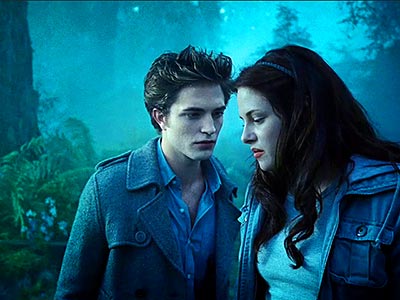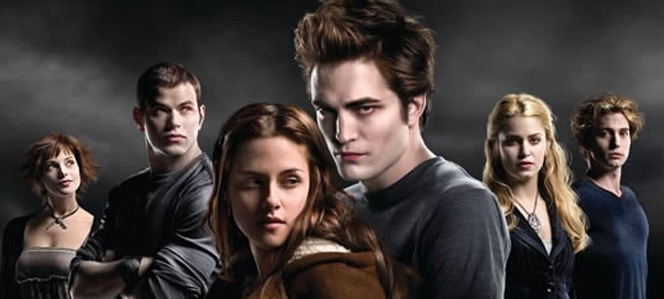Why Is Everyone Crazy About Vampires?
By Rev. Robert Barron
 You’d have to be living under a rock not to have noticed the prevalence of vampires in today’s culture. One of the most popular television shows in recent years was “Buffy the Vampire Slayer;” Anne Rice’s Vampire Chronicles continue to be widely read; HBO is currently running a series about vampires called “True Blood;” Wesley Snipes starred in a trilogy of vampire films called Blade; and one of the most successful movies of late is “Twilight,” the story of teen mortals and teen vampires in love. How do we explain the seemingly endless fascination with the undead?
You’d have to be living under a rock not to have noticed the prevalence of vampires in today’s culture. One of the most popular television shows in recent years was “Buffy the Vampire Slayer;” Anne Rice’s Vampire Chronicles continue to be widely read; HBO is currently running a series about vampires called “True Blood;” Wesley Snipes starred in a trilogy of vampire films called Blade; and one of the most successful movies of late is “Twilight,” the story of teen mortals and teen vampires in love. How do we explain the seemingly endless fascination with the undead?
Obviously, clever marketing has a good deal to do with it, but I think there are deeper reasons as well. There is, in the spiritual order, a law analogous to the law of the conservation of energy, which I would express as follows: when the supernatural is suppressed, it necessarily finds expression in indirect and distorted form. What we have witnessed in the last fifty years or so is the attenuating, and in some circles, complete disappearance of the biblical worldview. I’ve complained in the past about a bland, bored secularism that simply sets aside questions of the spiritual, the supernatural, and the transcendent. And this widespread bracketing of the religious dimension is abetted by a consumerist culture that teaches us in a thousand ways that sensual pleasure and wealth are the keys to happiness. For the secularist mind, God is, at best, a distant, indifferent force; Jesus is a guru of self-affirmation; and eternal life is a childish fantasy.
But in accord with the above-mentioned law, the supernatural will not be denied. The instinct for God and for a world that transcends the realm of ordinary experience is hard-wired into us and thus our desire, thwarted by the environing culture, will produce some distorted version of transcendence, some ersatz spirituality. Hence the world of vampires. Let me analyze just one feature of this universe. Besides blood sucking, the distinguishing mark of vampires is immortality: they are the undead, the eternally young. Though the materialist ideology around us insists that we are no more than clever animals who will fade away at death, deep within us is the sure sense that we are more than that. There are in us, as Shakespeare’s Cleopatra put it, “immortal longings,” for we are linked, whether we like it or not, to the eternal God who stands outside of time. When the proper religious sense of immortality is suspended, we produce the weird ersatz of the vampire who cannot die. I say ersatz, because authentic immortality has nothing to do with endless life in this world; rather, it has to do with being brought outside of time into the eternal realm of God. But when we’re starving spiritually, we find even thin gruel appealing.
Just recently, I came across a most illuminating remark by Anne Rice, the aforementioned author of the series of novels that effectively inaugurated the entire vampire craze. She said that the character of Louis, the tortured vampire who is famously interviewed in her first novel, was evocative of the many friends of hers from the sixties and seventies of the last century, people who had fallen into the morass of a post-Christian secularism. Like Louis, they knew they were caught up in something spiritually deadly, and again like the vampire, they could find no way out. The anguish of the Rice’s vampire was parallel to the anguish of the secular generation, thirsty for the very thing that their culture had denied. And what makes Rice’s observation even more fascinating is that she herself followed that thirst and made her way through the secularist delusion of her generation and rediscovered Christ. Just about ten years ago, Anne Rice re-embraced the vividly imagined and intellectually profound faith of her youth and since then has dedicated her writing exclusively to the Lord. She has brought out, so far, two volumes of a multi-volume life of Jesus, told in the first person; and her most recent text is the commencement of a new series of novels on angels. And she has asserted that, despite the pleas of her legion of fans, she will never write another vampire novel. What’s really fascinating is that the godmother of contemporary vampire chic has effectively seen through phony supernaturalism and embraced the real thing.
Anne Rice’s Catholicism brings to mind the Catholicism that played a central role in the original Dracula by Bram Stoker. Stoker, a nineteenth century Irishman, placed the vampire legend within the overarching biblical narrative of sin, grace, and redemption. In Stoker’s telling, Dracula had cursed God and hence fallen into a hellish state (which helps to explain his aversion to the crucifix). Professor Van Helsing, a scientist and a devout believer (yes, the two can co-exist!), brought the tortured vampire to salvation. Throughout the novel, Catholic themes abound: the Eucharist, the Mass, eternal life, etc. At the end of the nineteenth century, it was still possible to situate the vampire story within the far greater story of Christianity. What we witness today is a sad declension, whereby vampire tales are a bloodless substitute for robust Christianity.
